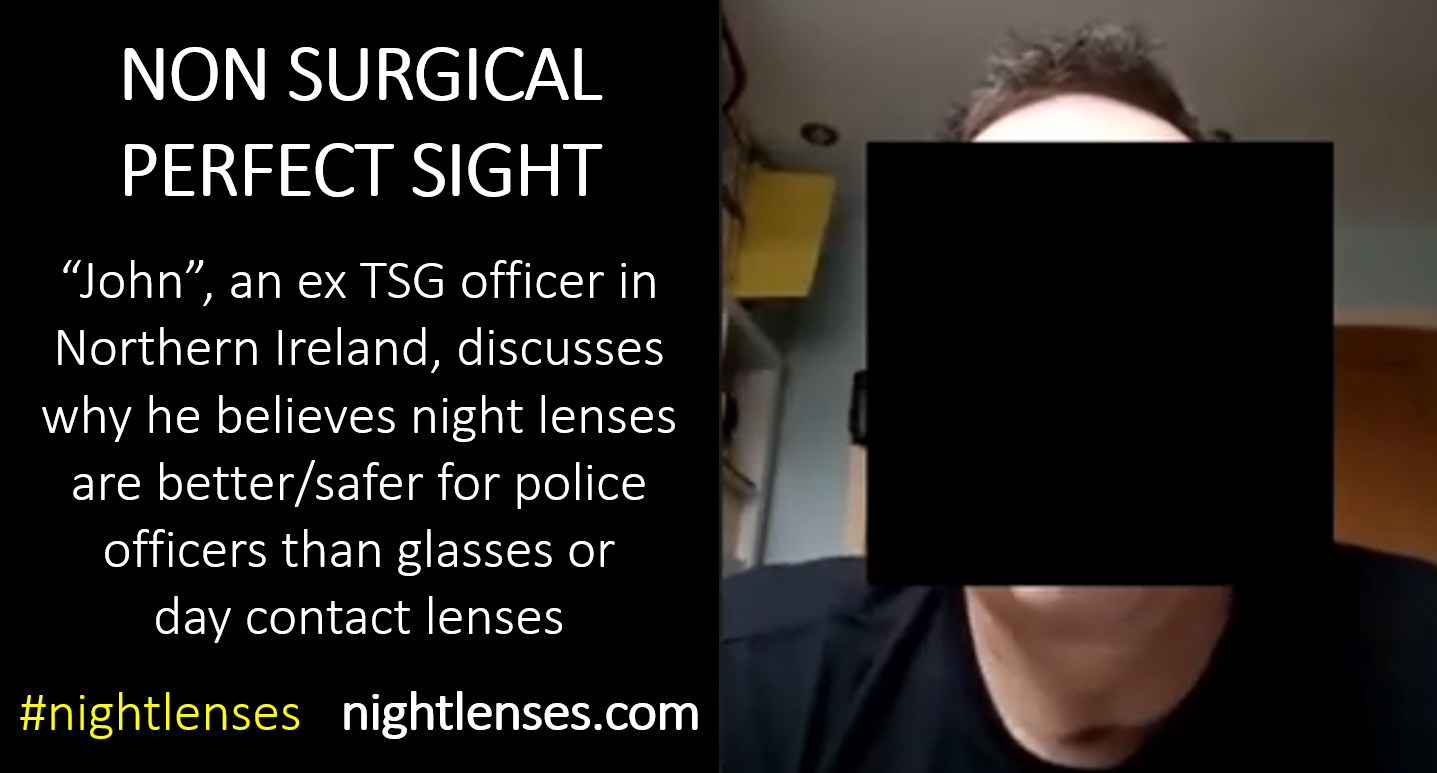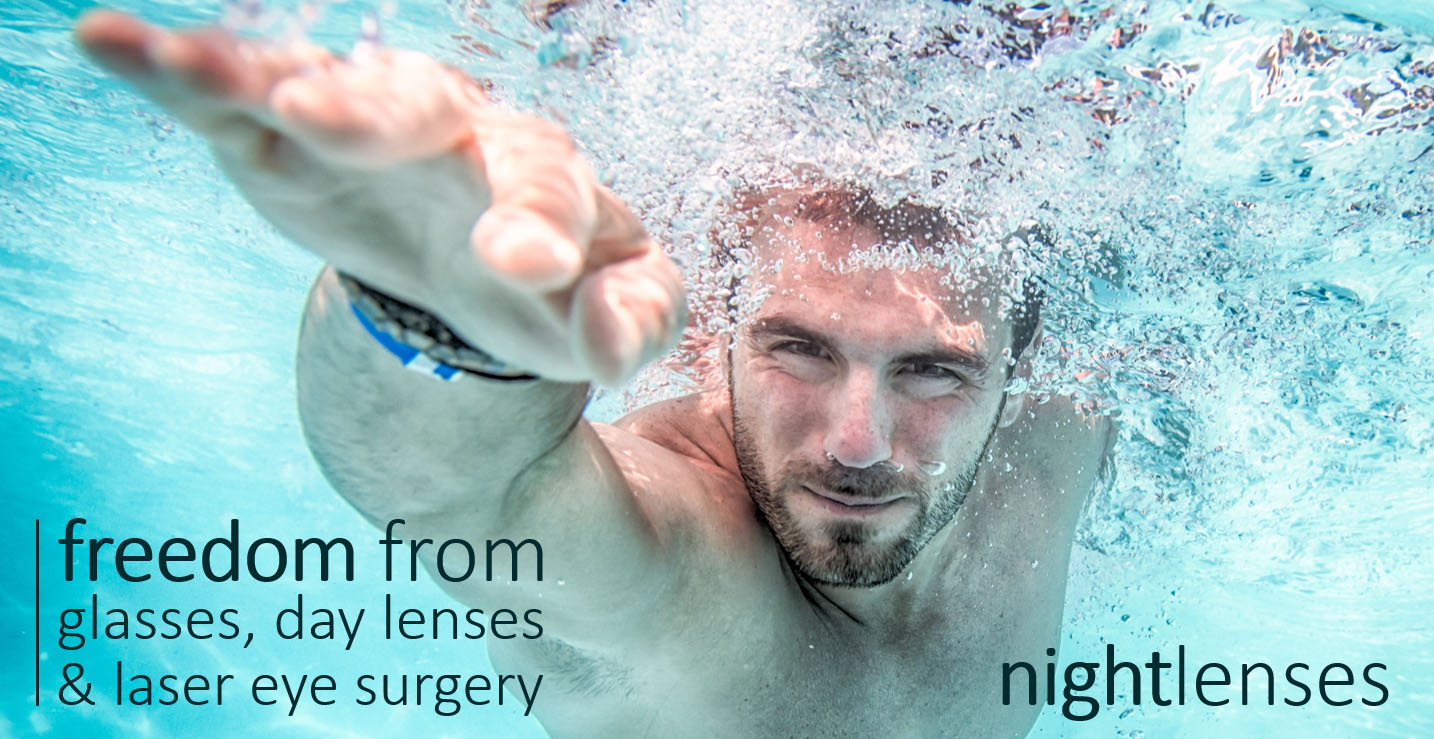We had a chat with “John” (keeping it on the down-low), a 47-year-old who spent a good 13 years on the front lines with TSG up in Northern Ireland. John just got himself set up with night lenses, and he’s singing their praises. He wishes he’d got them sooner, both for the job and his home life. His take is that policing is smoother and safer with night lenses compared to the daytime ones. Check out the transcript of his interview, catch the full scoop HERE.

Let me kick off by saying, I wish I’d known about these years ago! When I stumbled upon them, I couldn’t believe I hadn’t heard about them before. No eye doc ever clued me in. Since I got them, it’s like I’ve forgotten I ever had lousy eyesight because there’s no time of day when my vision isn’t on point. When I had daytime lenses, there were moments I had to yank them out and couldn’t see a thing. Now, all day long, my sight is crystal clear. It’s great not having to be conscious of them. With daytime lenses, I was always aware of them – whether I was biking, in the rain, swimming with the kids, or chilling on the beach. I was constantly cautious not to knock them out or something.
Feeling liberated now? Any changes in your life? I heard you talk about swimming, and it seems like a whole new ball game?
That’s the major shift. I’ve been hesitant to swim simply because my vision was off without my specs. It’s super irritating. Anyone who needs glasses knows the struggle of feeling like you’re not wearing anything. It’s frustrating not seeing clearly. Over the past three months, I’ve probably hit the pool more than in the last decade. The best way to describe it is like the first time I wore specs and everything was crystal clear – it’s the same feeling when I put on my goggles underwater after switching to night lenses. It’s like a whole new world!
Tell me about your time with the police.
I was with TSG for a solid 13 years in Northern Ireland.
So, an active role. Looking back, what’s the difference? What situations could have been problematic with daytime lenses, and if you had the chance with night lenses, you’d do it all over again?
TSG is a frontline gig – early and late shifts, dealing with public order, riots, Saturday night chaos in the city, and searching homes and buildings. One of my roles involved CBRN, wearing those big suits. When searching, which was a big part of the job, especially in dusty places or lofts with felt, it was too easy to get stuff in your eyes or contact lenses. Even with the provided goggles, it wasn’t enough to keep out grit and dust. You’d want to wipe your eye, and then you’d feel discomfort in your lens. Wiping your eye when tired and accidentally knocking your lens to the side – that was brutal! For the soft lenses I used to wear, it was excruciating, and in the middle of an operation, you can’t afford that. It happened a couple of times when I was driving at night, tired, eyes got dry, wiped them, and knocked them out – the worst time for it to happen.
What about when things got violent? Any worries about your daytime lenses on the job, and looking back, how would night lenses have made a difference, having nothing in your eyes at that moment?
The peace of mind. I was always conscious that I had lenses in, even after 25 years of wearing them. I was always hoping not to get them knocked out, whether in a fight, getting punched, or even just a scuffle. Even in the rain, you worry about them. If I had night lenses, it would be peace of mind – you just forget you’re wearing lenses as you have nothing in your eyes. Just that peace of mind when you’re heading out.

Absolutely. Since I got night lenses, I’ve been hitting the cycling scene. It’s been pretty damp lately, and the first time I went out, I got splashed in the face by the guy in front of me. The immediate thought was, “I don’t want water in my eyes.” Anyone with soft lenses knows it’s risky to get water in there. Then it hit me – no need to worry about that anymore. It was such a relief!
You mentioned earlier that you were out on your bike and spotted a bird in the sky, a hawk…?
I’ve noticed that my prescription hasn’t changed, but my long-distance vision seems to have kicked up a notch. Like I mentioned earlier, I saw a peregrine falcon from miles away with a clarity I haven’t had since I was probably 10!
The primary goal of this interview is to spread the word to fellow police officers and emergency workers – why would you suggest they consider night lenses?
It just gives you peace of mind. No worries about a lens getting knocked out. No fretting about CS or PAVA, whatever your force uses, getting in your eyes – which has happened to me with CS in the past. With the CBRN thing, you can’t wear soft lenses, so you have to deal with these little vision correction gadgets, and they’re a pain. You don’t have to worry about assaults, at least not on your eyes. It’s just peace of mind, and you can focus on your job without that concern. How people manage specs in my line of work, I have no clue. But if you can wear these, they’re way better.
After a while, night lens wearers look back, and the idea of putting a lens in when they wake up seems odd – are you there yet?
Oh, absolutely. I’d never go back to daytime lenses. It’s a no-brainer, better in every way imaginable.
ASK YOUR OPTICIAN ABOUT NIGHT LENSES
Night lenses are for those with short-sightedness (myopia) less than -5.00D. If you want more info, just ask your optician about night lenses, and they’ll walk you through the options. If you don’t have an optician, click on the ‘Find your nearest fitter’ image below to locate one.
USEFUL LINKS
– What are night lenses and how do they work?
– Check out other stories of people whose lives have been changed by night lenses
– WATCH this interview on YouTube
